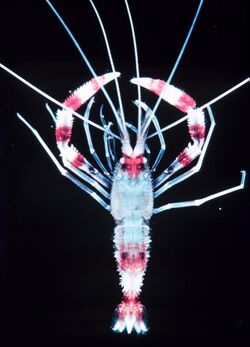Biology:Stenopodidea
| Stenopodidea | |
|---|---|

| |
| Stenopus hispidus | |
| Scientific classification | |
| Script error: No such module "Taxobox ranks".: | Animalia |
| Script error: No such module "Taxobox ranks".: | Arthropoda |
| Script error: No such module "Taxobox ranks".: | Malacostraca |
| Script error: No such module "Taxobox ranks".: | Decapoda |
| Script error: No such module "Taxobox ranks".: | Pleocyemata |
| Script error: No such module "Taxobox ranks".: | Stenopodidea Claus, 1872 |
| Families | |
| |
The Stenopodidea or boxer shrimps are a small group of decapod crustaceans. Often confused with Caridea shrimp or Dendrobranchiata prawns, they are neither, belonging to their own group.
Anatomy
They can be differentiated from the Dendrobranchiata prawns by their lack of branching gills, and by the fact that they brood their eggs instead of directly releasing them into the water. They differ from the Caridea shrimp by their greatly enlarged third pair of legs.[1]
Taxonomy
Stenopodidea belongs to the order Decapoda, and is most closely related to the Caridea and Procarididea infraorders of shrimp. The cladogram below shows Stenopodidea's relationships to other relatives within Decapoda, from analysis by Wolfe et al., 2019.[2]
| Decapoda |
| ||||||||||||||||||||||||||||||||||||||||||||||||||||||||||||
There are 71 extant species currently recognized within Stenopodidea, divided into 12 genera.[3] Three fossil species are also recognized, each belonging to a separate genus.[4][5] The earliest fossil assigned to the Stenopodidea is Devonostenopus pennsylvaniensis from the Devonian.[5] Until D. pennsylvaniensis was discovered, the oldest known member of the group was Jilinicaris chinensis from the Late Cretaceous.[6]
The cladogram below shows Stenopodidea's internal relationships:[2]
| Stenopodidea |
| ||||||||||||
Stenopodidea comprises the following families and genera:
- Macromaxillocarididae Alvarez, Iliffe & Villalobos, 2006
- Macromaxillocaris Alvarez, Iliffe & Villalobos, 2006
- Spongicolidae Schram, 1986
- Engystenopus Alcock & Anderson, 1894
- Globospongicola Komai & Saito, 2006
- Jilinicaris † Schram, Shen, Vonk & Taylor, 2000
- Microprosthema Stimpson, 1860
- Paraspongicola De Saint Laurent & Cléva, 1981
- Spongicola De Haan, 1844
- Spongicoloides Hansen, 1908
- Spongiocaris Bruce & Baba, 1973
- Stenopodidae Claus, 1872
- Devonostenopus † Jones et al., 2014
- Juxtastenopus Goy, 2010
- Odontozona Holthuis, 1946
- Phoenice † Garassino, 2001
- Richardina A. Milne-Edwards, 1881
- Stenopus Latreille, 1819
References
- ↑ Raymond T. Bauer (2004). "What is a caridean shrimp?". Remarkable Shrimps: Adaptations and Natural History of the Carideans. Animal Natural History Series. 7. University of Oklahoma Press. pp. 3–14. ISBN 978-0-8061-3555-7. https://books.google.com/books?id=b8YHIsnod3EC&pg=PA3.
- ↑ 2.0 2.1 Wolfe, Joanna M.; Breinholt, Jesse W.; Crandall, Keith A.; Lemmon, Alan R.; Lemmon, Emily Moriarty; Timm, Laura E.; Siddall, Mark E.; Bracken-Grissom, Heather D. (24 April 2019). "A phylogenomic framework, evolutionary timeline and genomic resources for comparative studies of decapod crustaceans". Proceedings of the Royal Society B 286 (1901). doi:10.1098/rspb.2019.0079. PMID 31014217. PMC 6501934. https://royalsocietypublishing.org/doi/10.1098/rspb.2019.0079.
- ↑ S. De Grave; C. H. J. M. Fransen (2011). "Carideorum Catalogus: the Recent species of the dendrobranchiate, stenopodidean, procarididean and caridean shrimps (Crustacea: Decapoda)". Zoologische Mededelingen 85 (9): 195–589, figs. 1–59. ISBN 978-90-6519-200-4. http://www.zoologischemededelingen.nl/85/nr02/a01.
- ↑ Sammy De Grave et al. (2009). "A classification of living and fossil genera of decapod crustaceans". Raffles Bulletin of Zoology Suppl. 21: 1–109. http://rmbr.nus.edu.sg/rbz/biblio/s21/s21rbz1-109.pdf.
- ↑ 5.0 5.1 Wade T. Jones; Rodney M. Feldmann; Carrie E. Schweitzer; Frederick R. Schram; Rose-Anna Behr; Kristen L. Hand (2014). "The first Paleozoic stenopodidean from the Huntley Mountain Formation (Devonian–Carboniferous), north-central Pennsylvania". Journal of Paleontology 88 (6): 1251–1256. doi:10.1666/13-059.
- ↑ Frederick R. Shram; Shen Yanbin; Ronald Vonk; Rodney S. Taylor (2000). "The first fossil stenopodidean". Crustaceana 73 (2): 235–242. doi:10.1163/156854000504183. http://decapoda.nhm.org/pdfs/11778/11778.pdf.
Wikidata ☰ Q932151 entry
 |
